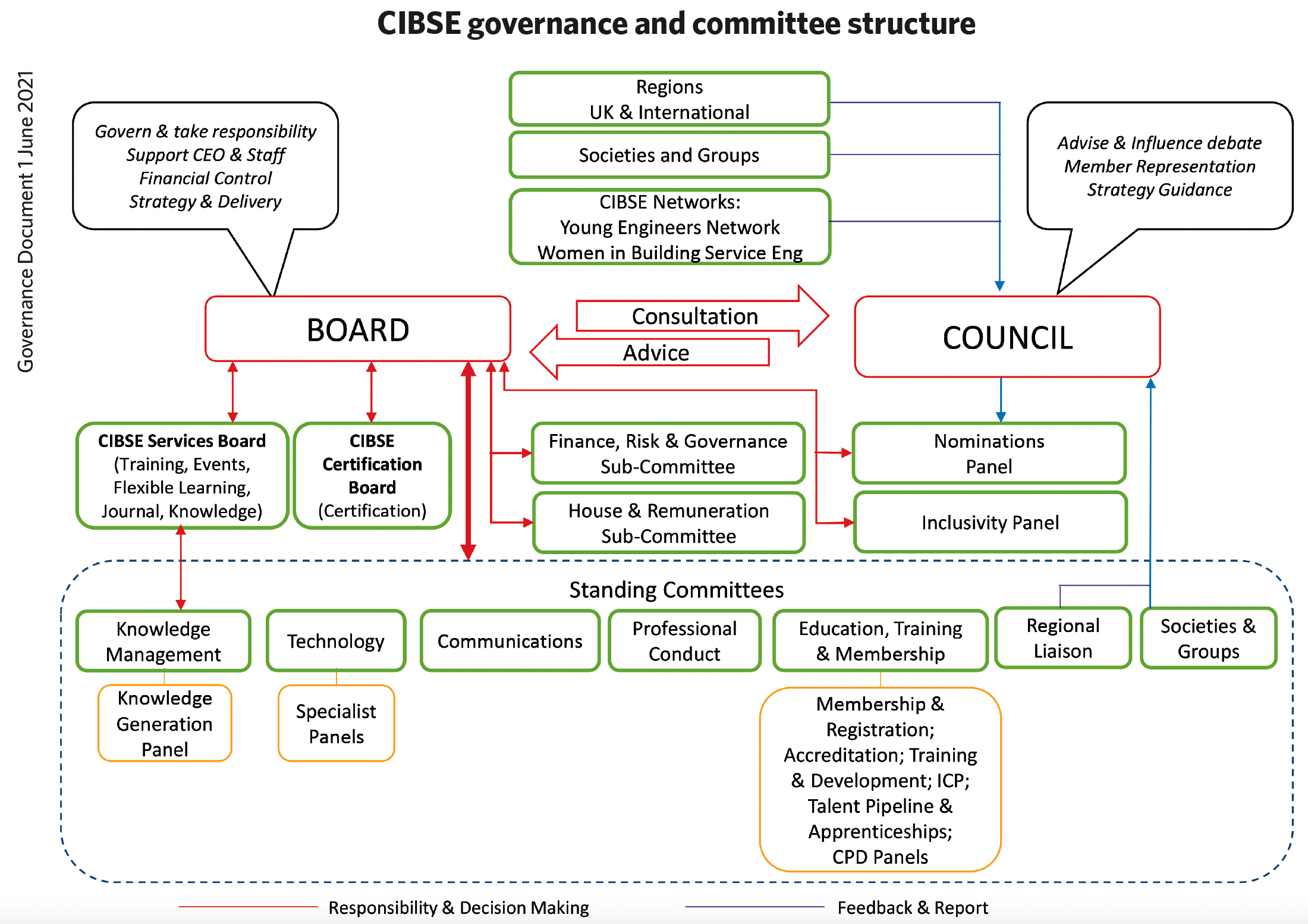
When Kevin Kelly said, in his Presidential address, ‘the more diverse you are, the more likely you are to attract Members.
I want this to be a big part of my presidential year’, he meant it. After the first Council meeting since his inauguration, Kelly is keen to raise awareness of the role of Council and to encourage more participation and engagement from a wider membership.
This was echoed by new CIBSE chief executive Ruth Carter in an interview with the Journal last month. She emphasised the strength of CIBSE’s communities and said a more consultative Council, which represents these communities, would be a way of drawing on their expertise.
She said that Council meetings were a good opportunity to put problems to experts representing CIBSE communities.
CIBSE Council acts as a consultative and representative body, while the CIBSE Board is the governing body of the Institution. The Council meets three times a year and works with the Board to help steer the Institution’s work and further the interests of members – for their benefit and for the benefit of the communities they serve.
The Council exists to influence the direction and strategy of the Institution, and receives regular updates on CIBSE progress. It receives update reports from the chief executive and is consulted by the Board on any major proposals for change.
You do not have to be on the Council toattend a meeting. Ask a member to take you along
The 83 members of the Council are made up of members of the Board, and representatives from the CIBSE Groups, Divisions, Regions and standing committees. Of these 83 members, 19 (23%) are women, against an overall CIBSE female membership of about 10%. Only around 7% of Council members are from black, Asian or minority ethnic backgrounds, and there is currently no related data on this for the membership as a whole, although the recent Inclusivity Panel s urvey hopes to gain better insight into the makeup of membership.
There is a drive to encourage more people from under-represented groups to join the Council and the Board, aiming to ensure it is inclusive and diverse. By having a Council membership that better reflects the society CIBSE serves, it can better meet their needs. Kelly said: ‘We all benefit from having contributions from more diverse viewpoints, both in terms of professional expertise and personal background.

CIBSE governance and committee structure
Everyone has something unique to bring and contribute.’ The most recent Council meeting, held in June – the first for Kelly as President and Carter as CEO – was a dynamic and lively affair. Kelly said it was a good illustration of how this engaged group of people can come together to contribute to the development of the Institution on behalf of members, providing a clear sense of focus for the Board and Executive.
Kelly is keen that as many people as possible get involved. As a CIBSE member, you do not have to be on the Council to attend a Council meeting. You can approach a sitting Council member and ask that they take you along; likewise Council members are being encouraged to invite others to join and see for themselves what they could contribute and get out of being on the Council.
Most recent Council meeting
In her first speech to Council as chief executive, Carter emphasised the strength of the Institution, but also the need to move forward to ensure CIBSE continues to embody a modern professional engineering institution.
She talked about how technology was changing the pace of connection, and how CIBSE had to respond by disseminating information efficiently, without compromising the quality of information and knowledge. Referring to Kelly’s Presidential address, and the focus on diversity and inclusion, Carter said CIBSE must make sure it ‘walks the talk’. She made a personal plea to Council members to encourage others to get involved. ‘Reach into your communities and seek out new talent coming through that will give us a broader diversity in terms of gender, ethnicity and other groups,’ she added.
Carter finished her speech with a commitment to move CIBSE forward, to ensure it is a modern, professional, exemplar engineering institution providing high-quality information and knowledge in a timely manner.
Safety first
The Council meeting also included a discussion on the Draft Building Safety Bill, published in July 2020. Hywel Davies, CIBSE technical director, outlined the proposed significant changes in the working arrangements for many in the construction and property sectors, and for many of CIBSE’s members.
While much of the reporting is around ‘higher-risk buildings’ – those more than six storeys or 18m high, with two or more residential units, or for care or hospital use – Davies said the bill is wide-ranging.
This was followed by a discussion about how well prepared CIBSE members and the firms that employ them are to respond to the bill. It was agreed that it will require a major change in the way that competence of engineers is developed, assessed and recorded. While this will raise the profile of engineers, it will also increase responsibility, and there was concern about how effectively it will be enforced.
The new duty holder regime introduces significant responsibilities for companies, and there is a worry that small and medium-sized businesses will choose not to take on the new duties because of the increased burdens, including costs. While larger businesses are beginning to prepare, smaller firms may be unaware of the scale of the challenge.
There was widespread support – and already some preparation – for the introduction of mandatory continuing professional development (CPD), although no clear view on regular revalidation of Engineering Council registration.
It is clear that the built environment sector will be much more tightly regulated under the new regime. CIBSE is committed to working with its members and companies to support them through the introduction of the new legislation.
Other presentations to Council included an update from Society chairs: new Society of Light and Lighting president Ruth Kelly Waskett; Institute of Local Exhaust Ventilation Engineers’ Dean Greer; new Society of Façade Engineering’s Chris Aspinall; Society of Public Health Engineers’ Peter White; Society of Digital Engineering’s Andrew Krebbs; and Patrons’ Scott Mason.
Summary of actions
●Consult Regions and Groups on best ways to enable effective hybrid meetings
●Invite a wider range of members to attend committees to encourage broader participation
●Consider relationship between Societies and Groups, and how they might be able to work together
●Look at how to support companies to improve CPD quality and raise awareness of importance of accredited CPD.
A full list of Council members, and all CEO reports made to Council, are available at www.cibse.org/about-cibse/governance/council
If you would like to attend a Council meeting as a guest, approach your Regional, Group or Division chair, or email cbott@cibse.org
Who we are
Newly elected members Colin Ashford and Dimple Rana explain why they wanted to be involved:
Colin Ashford

Colin has been on the Council for more than 25 years, but has recently been re-elected to CIBSE Council.
There is a joy in sharing the years of experience and knowledge. Being a Member of CIBSE Council gives opportunities to mentor younger members and widen their technical and management skills. Combine this with introducing them as visitors to Council, which gives them a real personal advantage by helping them understand the politics and high-level technical requirements of CIBSE as an Institution.
Once involved with CIBSE as a Member of Council, there is a realisation of how much more there is beyond being a technical qualifications body.
Dimple Rana

As a Council member, I am keen to encourage a range of people to get involved in CIBSE activities and seek membership. Through this role I would like to engage students and young professionals in particular, as I think they have a lot to contribute, as well as gain, from CIBSE.
In addition, I am keen to support CIBSE as it evolves and responds to changing technology and an increase in digital engineering trends. I think it will be important to ensure CIBSE continues to stay relevant and is a valuable resource for students and professionals in the industry for years to come.
